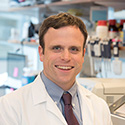Genetic Maps of Earth’s Cities, Terrestrial Wastewater, and Visiting Sleighs/Spacecraft
This webinar is part 3 of the Microbiome Educational 3-Part Webinar Series.
In this webinar, you will learn about:
- The MetaSUB Project's metagenomic maps of over 100 global cities
- How wastewater tracing of bacteria and viruses impacts those cities
- Tracing the genomics of spacecraft
Summary
Characterizing the microbial populations present in human environments provides an opportunity to understand and track microbial impacts on health and to protect fragile environments. Metagenomic studies of urban biomes and spacecraft provides a microbial map that can inform health research and policy.
In this webinar, Dr. Chris Mason from Weill Cornell Medicine discusses how to build microbial maps of subway systems, wastewater streams and spacecraft using metagenomic methods. You will have the chance to learn more from our live Q&A session.
View other webinars in this series:
Speaker

Christopher E Mason, PhD
Professor, Department of Physiology and Biophysics
Weill Cornell Medicine
Dr. Christopher Mason completed his dual B.S. in Genetics and Biochemistry from University of Wisconsin-Madison, his Ph.D. in Genetics from Yale University, and his post-doctoral training in Clinical Genetics at Yale Medical School, while also serving as the first Visiting Fellow of Genomics, Ethics, and Law at Yale Law School. He is currently an Associate Professor of Computational Genomics at Weill Cornell Medicine, with appointments in the Department of Physiology and Biophysics, the Institute for Computational Biomedicine, the Tri-Institutional Program on Computational Biology and Medicine, the Meyer Cancer Center, and the Feil Family Brain and Mind Research Institute, and is Director of the WorldQuant Initiative for Quantitative Prediction. He has won the NIH’s Transformative R01 Award, the Vallee Scholar Award, the CDC Honor Award for Clinical Testing, and the WorldQuant Scholar Award. The Mason laboratory develops and deploys new biochemical and computational methods in functional genomics, with a focus on multi-omic, longitudinal profiling, for both patients on Earth and NASA astronauts in space.